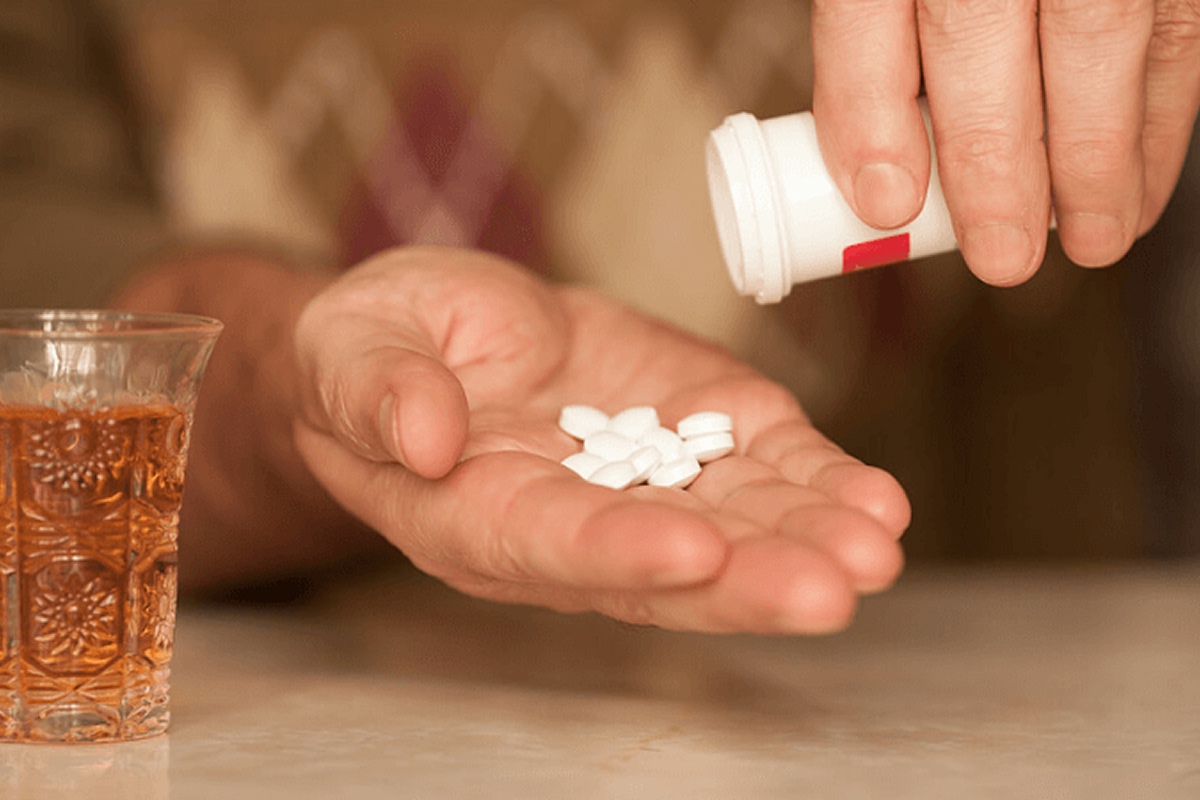Key Takeaways
- Mixing hydrocodone with alcohol is extremely dangerous and can cause life-threatening effects.
- Hydrocodone addiction can develop quickly, even when the medication is prescribed.
- 12 South Recovery provides safe detox and effective treatment to help you recover from dependence on both substances.
When Pain Relief Becomes Risky
It often starts harmlessly, taking hydrocodone for pain and later having a drink to unwind. But mixing hydrocodone and alcohol is far more dangerous than most people realize. Together, they can slow your breathing, damage your organs, and even be life-threatening. What seems relaxing at first can quickly lead to dependence or overdose. At 12 South Recovery, we help people recover safely and rebuild their lives after addiction to substances like hydrocodone and alcohol.

What Is Hydrocodone?
Hydrocodone is a prescription painkiller used to treat moderate to severe pain. It’s part of a class of drugs called opioids, which work by binding to receptors in the brain and spinal cord to block pain signals. While effective, it also triggers feelings of calm and euphoria, which can lead to misuse.
Doctors usually prescribe hydrocodone in combination with acetaminophen (like Norco or Vicodin). It’s meant for short-term use, but long-term use increases the risk of hydrocodone addiction. Over time, your body adapts to the drug, and you may need more to feel the same pain relief.
What Happens When You Mix Hydrocodone with Alcohol?
Mixing hydrocodone and alcohol puts enormous stress on your body, especially your brain and central nervous system. Both substances slow breathing and heart rate, which can cause respiratory failure, coma, or even death.
When combined, they amplify each other’s sedative effects. Even small amounts can lead to:
- Drowsiness or dizziness
- Nausea and vomiting
- Confusion or memory loss
- Shallow breathing
- Unconsciousness
The problem is that alcohol also makes it harder for your liver to break down hydrocodone. That means the drug stays in your body longer, building up to dangerous levels.
Why Mixing Hydrocodone and Alcohol Is So Dangerous
The danger lies in how these substances interact. Hydrocodone and alcohol both depress the central nervous system, which controls vital functions like breathing, heart rate, and reflexes.
When mixed, the risk of overdose skyrockets. Many overdoses happen because people underestimate how strong the combination is. Even one extra pill or one more drink can push the body past its limit.
The mix also increases the risk of blackouts, falls, and car accidents. And over time, the body can become dependent on both substances, leading to addiction that’s hard to manage without professional help.
How Hydrocodone and Alcohol Affect the Body and Mind
Together, hydrocodone and alcohol affect nearly every system in your body.
Physical effects include:
- Slow or irregular breathing
- Drowsiness and poor coordination
- Low blood pressure
- Liver and kidney damage
- Digestive issues
Mental and emotional effects include:
- Confusion or disorientation
- Memory problems
- Mood swings and irritability
- Increased anxiety or depression
You might feel relaxed or numb at first, but that calm quickly turns into loss of control. The longer you mix, the more your body struggles to function normally.
Short-Term Effects of Mixing Hydrocodone with Alcohol
The short-term effects can hit fast and hard. Depending on how much you’ve taken, you may experience:
- Intense drowsiness or sedation
- Dizziness or fainting
- Blurred vision
- Trouble thinking clearly
- Slow breathing or heartbeat
Even a single instance of mixing can lead to alcohol poisoning, overdose, or fatal respiratory failure. Because these substances interact unpredictably, there’s no safe amount to mix.
If someone shows signs of overdose, slow breathing, blue lips, or unconsciousness, call 911 immediately.
Long-Term Risks of Mixing Hydrocodone and Alcohol
The long-term consequences of combining hydrocodone and alcohol are severe and can last for years, even after stopping use.
Physical risks:
- Liver failure from combined toxicity
- Chronic gastrointestinal problems
- Heart complications
- Increased risk of overdose
Mental and emotional risks:
- Depression and mood instability
- Anxiety and paranoia
- Impaired memory and focus
- Dependency on one or both substances
Over time, your body and mind adjust to functioning with these substances. When you try to stop, withdrawal can feel unbearable, a key sign of dependence.
Recognizing the Signs of Dependence or Addiction
Addiction can creep up quietly. At first, it might seem like you’re just following your doctor’s directions or having a drink to unwind. But if you’ve noticed these signs, it may be time to reach out for help:
- Taking more medication than prescribed
- Drinking while on prescription medication
- Craving hydrocodone or alcohol regularly
- Feeling anxious or sick without them
- Neglecting responsibilities or relationships
- Memory lapses or blackouts
You don’t have to wait until things spiral out of control to get help. Recognizing the signs early can prevent more serious health complications and emotional strain.
What Happens When You Stop Mixing Hydrocodone and Alcohol
When you stop using both substances, your body needs time to adjust. Because both hydrocodone and alcohol affect brain chemistry, withdrawal symptoms can appear within hours.
Common withdrawal symptoms include:
- Nausea and vomiting
- Shaking or sweating
- Restlessness or anxiety
- Muscle pain
- Trouble sleeping
- Depression or irritability
Trying to detox at home can be risky. Without medical support, withdrawal can lead to dehydration, relapse, or severe discomfort. That’s why professional detox is the safest choice.
How Detox for Hydrocodone and Alcohol Works
At 12 South Recovery, detox is the first step in helping your body safely eliminate hydrocodone and alcohol while managing withdrawal symptoms.
Here’s what you can expect:
- Medical evaluation: Our team reviews your substance use, health history, and needs.
- Supervised detox: You’ll be monitored 24/7 to manage symptoms and stay safe.
- Medication support: Certain medications can reduce cravings and discomfort.
- Emotional care: You’ll have access to therapy and encouragement throughout the process.
Treatment Options for Hydrocodone and Alcohol Addiction
After detox, continued treatment helps address the emotional and behavioral aspects of addiction. At 12 South Recovery, we offer several addiction treatment options based on your needs:
- Residential Treatment: A structured, supportive environment focused on healing and rebuilding.
- Partial Hospitalization Program (PHP): A full-day treatment program for intensive therapy.
- Intensive Outpatient Program (IOP): Flexible scheduling for continued care while reintegrating into daily life.
- Continuing Care and Alumni Support: Long-term guidance and relapse prevention.
Every client receives a personalized plan that builds stability, teaches coping skills, and helps you regain purpose in life.
Therapies That Support Emotional Healing and Long-Term Sobriety
At 12 South Recovery, recovery means healing the whole person: physically, mentally, and emotionally. Our therapies help clients uncover the root causes of addiction and develop lasting tools for recovery.
We use:
- Cognitive Behavioral Therapy (CBT) to change harmful thought patterns.
- Dialectical Behavior Therapy (DBT) to build mindfulness and emotional balance.
- Eye Movement Desensitization and Reprocessing (EMDR) to address trauma.
- Individual and Group Therapy to foster connection and accountability.
- Holistic and Adventure Therapy to promote strength, creativity, and joy in sobriety.
Life After Treatment: Finding Strength and Purpose in Recovery
After completing treatment, life starts to open up again. You regain clarity, rebuild relationships, and start to feel strong both mentally and physically.
At 12 South Recovery, we focus on helping clients build meaningful lives after treatment through continued therapy, support groups, and healthy routines. Our alumni program encourages ongoing connection with peers who share the same goals: living a sober, purposeful life.
Recovery from Hydrocodone and Alcohol Addiction at 12 South Recovery
Mixing hydrocodone with alcohol can be deadly. What starts as pain relief or relaxation can quickly lead to addiction or serious health problems. If you’re struggling to stop or worried about the risks, 12 South Recovery can help. We provide safe detox, personalized treatment, and ongoing care to help you recover and rebuild your life. Call 12 South Recovery today to begin your path toward lasting healing and freedom from addiction.































